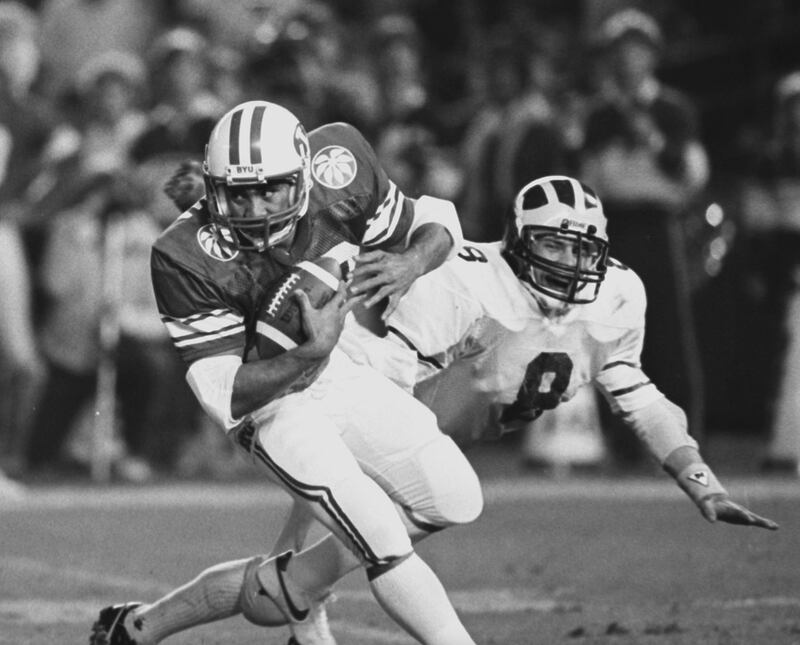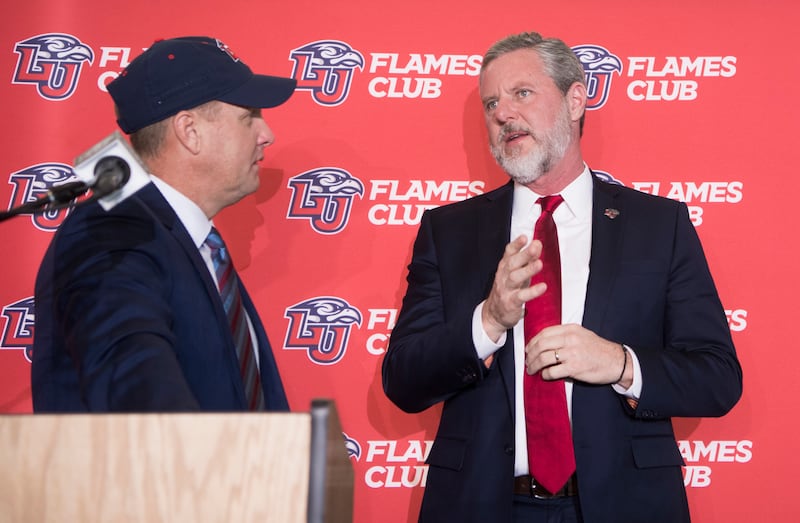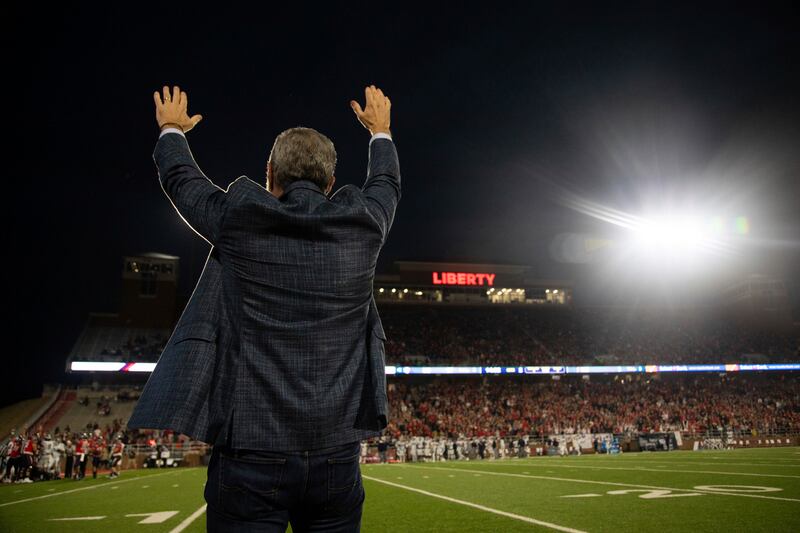SALT LAKE CITY — Jerry Falwell Jr. is coming to Provo this weekend, and not for a theological or political summit. He’ll be at LaVell Edwards Stadium, witnessing the fulfillment of his father’s vision.
He sat among the congregation of Thomas Road Baptist Church in 1970, when the Rev. Jerry Falwell Sr. — the man who rose to fame as a prominent televangelist and founder of the Moral Majority — first shared this vision. Not spiritual in nature, but as tangible as the pews where they sat: A university that would become for evangelical Christians what BYU is to Latter-day Saints; what Notre Dame is to Catholics.
And like those schools, Liberty University would become a football powerhouse. One day, he predicted, Liberty would play at Notre Dame, Baylor and BYU, becoming a source of pride to evangelicals across America.
The road was long. The Flames started playing football in 1973. In 1988, they joined the NCAA’s FCS — then Division I-AA — where they languished for 29 years.
But since Falwell Jr. became Liberty’s president in 2007 following his father’s death, he’s labored to elevate the program. Thanks to an influx of money from online adult education, he’s invested $1.6 billion in infrastructure projects, many related to athletics. They include a $32 million athletic administration building, new swimming and indoor track and field complexes, and a $29 million indoor football practice facility. Critics say Liberty is tilting too much toward athletics, but Falwell dismisses those comments.
“It’s kind of comical to me when people say Liberty has left its original mission to go big-time in sports, because that was the original mission,” he said.
In 2017, when Liberty finally started moving to the FBS level, the top tier of college football, BYU was among the first calls athletic director Ian McCaw made.
Texas Christian, Southern Methodist and Baylor are all religious schools that have thrived on the gridiron, but BYU — along with Notre Dame — was Liberty’s role model. In fact, Falwell Jr. said the “LU” that decorates Liberty Mountain in Lynchburg was inspired by a trip to Utah some 15 years ago, when he saw the Y.
“BYU is very much a program that we aspire towards as a faith-based school that’s had tremendous success,” McCaw said, “including winning the national championship.”
Saturday the Flames arrive with firepower. Liberty (6-3) ranks 19th in the nation in passing offense. Senior quarterback Stephen Calvert’s 293 yards passing per game rank 13th, and senior wideout Antonio Gandy-Golden ranks third among receivers in yards per game.
Nevertheless, Liberty’s weak schedule means it hasn’t been tested much, and BYU (4-4) is favored by 17 points. The significance of conquering those long odds can’t be overstated, and Falwell decided to attend the game this week on the off chance it happens (which would also make Liberty bowl eligible for the first time).
“It’d be more than just an upset,” he said. “It’d be the culmination of 48 years of planning and a 48-year vision for Liberty.”
Either way, Falwell has several things in common with the Cougar faithful, notably their belief in God and shared enthusiasm for what some may see as an unholy act: Men battering each other in secular cathedrals in pursuit of victory, trophies and SportsCenter highlights.
What’s so Christian about football?
Football has been inspired by Christian faith since the game’s origins as an organized sport at Ivy League colleges in the mid-to-late 19th century, where it became an expression of “muscular Christianity.”
Upper- and middle-class Protestant men — the type who attended Princeton and Yale — pushed back against Victorian sentimentality and the encroachment of sedentary office jobs, according to Bentley University history professor Clifford Putney, who wrote the literal book on muscular Christianity (called “Muscular Christianity: Manhood and Sports in Protestant America, 1880-1920”) by preaching a gospel of manly toughness. Their brethren, they argued, were becoming weak, and weak men couldn’t properly evangelize. They called for artificial exercise and strength. Think: Teddy Roosevelt.
Universities representing other Christian traditions have also influenced the sport. Notre Dame normalized the forward pass in 1913, kicking off a century of dominance. BYU became a cradle of the West Coast and Air Raid passing offenses.
More broadly, coaches like Nebraska’s Tom Osborne and Clemson’s Dabo Swinney have built winning cultures around faith in Jesus Christ, evangelizing and cultivating proper Christian young men: Osborne and his staff started each day with 10 minutes of devotional prayer, and Clemson star receiver DeAndre Hopkins was baptized on the public university’s practice field in 2012. Players like Tim Tebow, a two-time national champion and Heisman winner at Florida, celebrate touchdowns in an attitude of prayer and use their pedestal to testify.
It’s unclear exactly why football has become the sport most linked with Christianity, but it could be their shared qualities.
Its worshippers — ahem, fans — congregate weekly in grand structures adorned with posters of past glory, reminiscent of bibilical scenes depicted on stained-glass windows; games begin with a procession onto the field, often accompanied by rituals — from Miami’s fire extinguisher fog to Clemson’s run down the hill; and on the green 100-yard altar, players sacrifice their bodies, push themselves through pain and exhaustion, learning important lessons of sacrifice for a better good.
Then they do it again the following week. In between, fans devour literature about players.
The games aren’t just games, but pageants. Attendees carefully curate their game-day clothes and plans. For three or four hours, students, faculty and admirers come together to experience a lore and heritage unique to their school. They leave knowing that the song they sang at the end of the third quarter, and the player honored at halftime, and the colors worn by tens of thousands of people just like them are unique to their group, and through such bonds, they find meaning in helmeted men chasing a leather ball.
Glenn Caruso, the head coach at St. Thomas University, a catholic school in St. Paul, Minnesota, hypothesized that football’s entanglement with Christianity could also result from some of its values. Football, he explained, teaches players to be part of a larger whole, working toward a common goal with varying duties, anonymous and significant at once.
Bethel University history professor Chris Gehrz — “the Pietist Schoolman” — added that football helps players develop their “whole person” — a core value at Bethel, a Christian college in Minnesota. But he also highlighted two ever-present tensions: character vs. winning, and violence vs. peace. He said the former becomes harder at higher levels. “A university president’s tenure,” he said, “will be judged by the results of the Big 10 conference schedule as much as by National Science Foundation grants.” He said the latter counters Christian commands to turn the other cheek. How do you become a peacemaker amid prescribed violence?
Caruso acknowledged the game is violent. And yes, there’s pressure to win — especially at bigger schools. But a Christian coach should be able to teach players to transcend the violence, to use it as a tool rather than a source of joy. And temptation to pursue wins at the cost of character, however difficult, must be avoided.
“When I go up there,” he said of his judgment day, “I am positive that he is not going to give a darn what my trophy case looks like. He ain’t gonna ask me what my record is. And he don’t give a damn whether or not we won a championship. He’s gonna ask me four questions. He’s gonna say ‘Were you a good father, were you a good husband, did you lead people to the best of your ability, and did you believe in me?’ As sure as I’m sitting here, I’m positive those are the four questions I’m getting. And there are some places that may not allow you to answer yes while being a dominant athletic program.”
Winners and losers
The Green Bay Packers reached the 1997 Super Bowl thanks in part to the “minister of defense,” Reggie White. He famously claimed God wanted the Packers to reach the season’s final game. Shortly thereafter, the religion editor of the Sacramento Bee called then-BYU sports information director Val Hale.
The editor asked whether God cared who won the Super Bowl. BYU’s future men’s athletics director said not as much as he cared about how the players lived their lives, interacted with teammates, etc. But then the editor posed a “tougher question.”
“Does God care if BYU wins?” he asked.
“Well, let me just say that every time BYU loses a game, there is a natural disaster somewhere in the world,” Hale quipped. “You’ll have to infer from that what you want.”
He laughed when retelling the story; perhaps BYU’s loss to South Florida earlier this season didn’t trigger a red tide outbreak along Florida’s gulf coast. But the Cougars’ losses (and wins) do send a ripple across the country. The school is owned by The Church of Jesus Christ of Latter-day Saints, making its football team a national symbol for members — and a potent missionary tool.
During Hale’s time as athletic director, he often received letters from fans who said their exposure to BYU football led them to convert. But he said football’s religious power worked most noticeably on the athletes, many of whom arrived as nonmembers and were baptized either in Provo or later in life. He once made a list of athletes who joined the faith at BYU, and he said it spanned multiple single-spaced pages.

The end of Hale’s tenure at BYU came amid one of the program’s worst years as far as off-field incidents. Fourteen players were disciplined for honor code violations, leading to his own termination and the resignation of football coach Gary Crowton.
Certain fans would like to see BYU relax its honor code requirements for athletes in order to be more competitive. Vai Sikahema, who played on BYU’s 1984 national championship team, believes this would be a mistake. He said he did not appreciate the honor code when he was there, but now, he said he and most of his teammates believe it’s positively impacted their lives. Conduct matters.
“That may not be an issue at Florida State or Alabama,” he said, “but at BYU, it is. It’s a big, big deal.”
And he wants it to stay that way. It helps preserve the school’s reputation for integrity and morality. Liberty, where students sign a similar honor code to BYU’s, has cultivated a different image — but one nevertheless informed by the school’s faith.

Liberty and forgiveness for all
Critics question two fairly recent hires that have accelerated Liberty’s progress. McCaw arrived in 2016, a wildly successful athletic director, formerly at Baylor, available only because of his association with a highly publicized sexual assault scandal at the school. And in 2018, McCaw hired Hugh Freeze, a successful head coach who had been fired by Ole Miss for a “concerning pattern” of phone calls to escort services.
As far as Falwell is concerned, both were perfect hires.
He believes evangelical Christianity can be distilled to unfettered forgiveness and belief in Christ’s redemptive power. Once you understand that, he explained, such a decision isn’t just uncontroversial — it’s expected.
“Christianity is about forgiveness,” he said. “It’s about second chances, third chances, fourth chances. Once people realize what Christianity is, then they stop asking those questions. Because there’s not one single person on Earth who’s any worse in God’s eyes than anybody else.”
It doesn’t hurt that both men are good at their jobs.
McCaw spent 13 years building Baylor into a powerhouse, with national championships in four sports and two Big 12 football titles, until the Baptist university released a report in 2016 revealing a pattern of sexual assault and lax prevention efforts at the school and within the football program.
Freeze became a household name in 2013 when he landed a top-10 recruiting class featuring four five-star players and the nation’s top prospect, Robert Nkemdiche. In 2014, his Rebels were ranked as high as third, and he led them to a Sugar Bowl win the following season. But the NCAA slammed his program with recruiting violations in 2016, and the escort calls were revealed a year later.
After his firing from Ole Miss, Freeze spoke at a Liberty convocation — a twice weekly meeting of students featuring guest speakers ranging from Tim Tebow to Tomi Lahren to Ray Rice to Simone Biles — in early 2018 about how he’d messed up and found forgiveness.
Later that year, when then-coach Turner Gill retired, McCaw’s first call went to Freeze.
When Freeze leads his team onto the field Saturday at LaVell Edwards Stadium, Falwell will be watching. He’ll encounter a team and a school in many ways similar to his own: Players must abide by honor codes; both schools face recruiting limitations; and both serve as symbols to church members who may have little association with the schools themselves. All reminders of how far his program has come.
But if his gaze wanders from the game and maps the stadium, he’ll also see what Liberty doesn’t have: All-Americans, a Heisman Trophy winner and a national championship. The game may be a milestone, but it’s also a reminder of how much work remains.


